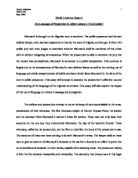Miyuru Fernando
World Literature Paper One
The Portrayal of Society in The Sound of Waves and The Outsider
Miyuru Fernando
June 16, 2002
Word Count: 1,230
The Portrayal of Society in The Sound of Waves and The Outsider
Society often plays a major role in many novels, and can be portrayed in a variety of ways. In The Sound of Waves and The Outsider, two opposing views on society are displayed. These books show how one person’s moral actions can be regarded as highly acceptable by society, while another person’s still moral actions can result in rejection and loathing.
In The Sound of Waves, Mishima illustrates the norm: society is acceptant of moral individuals. Using Shinji as an example, it is apparent that Shinji has been accepted by society when he earns the right to marry Hatsue, thanks to his show of honour, purity, and courage.
Compared to the other young men, Shinji is an exceptional fisherman. At the plot’s climax, Shinji’s morality becomes glaringly apparent since it is to be blamed for his right to marry Hatsue. Over the course of the plot, Shinji always displays the utmost honour, always deserving of what he earns. Shinji works hard on the fishing boat, and pays his respect for the lighthouse keeper by dropping by with fish every now and then. He earns a decent living, and nothing more. Another example of his honour would be when he lies to Yasuo about not having a picture of Hatsue, when truly, he does. Shinji retains his honour in this fashion by not bragging. Regarding his purity, Shinji restrains his sexual urges when alone and naked with Hatsue during a storm. Entranced by her beauty since her arrival on the island, Shinji somehow manages to keep from crossing the border of morality. Despite criticism from his peers about not winning the “prize,” Shinji remains focussed and still sticks to his morals. Finally, in a great show of courage, Shinji volunteers to tie a lifeline to a buoy by swimming in the raucous sea during a storm. Initially “cowering” (p. 161) from the question of volunteering, Shinji collects himself and becomes “ashamed of himself” (p. 161) for not volunteering. When saying that Shinji is ashamed of himself for not volunteering at first, Mishima is merely showing Shinji’s true self, where it should be obvious to the reader that Shinji has high standards and lives his life following the greatest of values. Of course, Shinji’s efforts do not go unnoticed as they exemplify the morals of Uta-Jima’s society to an impressive level: Shinji, and not Yasuo, earns the right to marry Hatsue. In conclusion, society is portrayed as acceptant of moral individuals. It should also be noted that despite Yasuo’s wealth, he lacks Shinji’s morality, and therefore does not earn the right to marry Hatsue. It can then be said that the society portrayed in The Sound of Waves is purely based on morality, and not biased toward material possessions.







